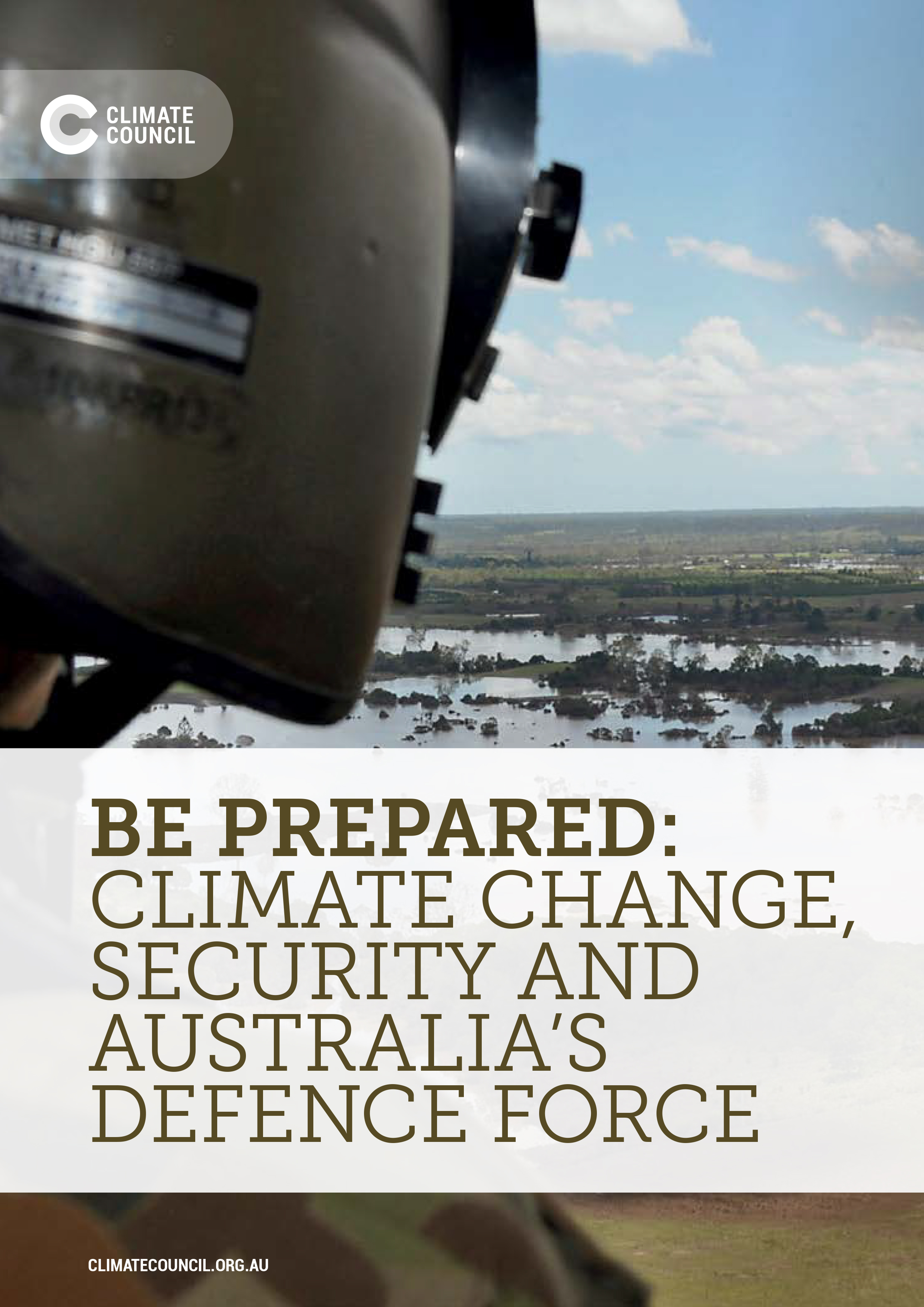Climate change is a significant and growing national security threat that is undermining the preparedness of the Australian Defence Force, our new report authored by Australia’s former Defence Chief found.
Be Prepared: Climate Change, Security and Australia’s Defence Force report reveals Australia is lagging behind its UK and US allies in preparing its militaries for climate change, with Australian Defence Force resources already under strain from the increased need for humanitarian assistance in response to climate-induced disasters.
Key Findings
1. Climate change is a security threat. Climate change poses a significant and growing threat to human and societal wellbeing, threatening food, water, health and national security.
- Food security. The 2008 food crisis increased the number of undernourished people worldwide by 75 million. The cost of wheat increased by 127%, rice by 170% and maize by 300%. By increasing the frequency and severity of droughts in important food producing regions, climate change was a key factor in the crisis.
- Water security. Climate change will significantly affect the accessibility and availability of freshwater resources. Rising sea-levels can result in saltwater intrusion of coastal acquifers, while rainfall patterns are changing worldwide.
- Extreme weather. Climate change is increasing the frequency and severity of many extreme weather events. These events affect individuals and societies through the displacement of people, damage to critical infrastructure, and damage to health and livelihoods.
2. Global military forces are labelling climate change a “threat multiplier”.
- The impacts of climate change can exacerbate other stresses, like poverty, economic shocks and unstable institutions, to make crises worse. For instance, increasing extreme weather events can reduce the availability of food. Extreme weather and water scarcity contributed to soaring food prices, which saw food riots erupt across Africa and the Middle East in 2008. Rising food prices in 2011 have also been identified as one of the factors that destabilised the Middle East, leading, for example, to the “Arab Spring”.
- Climate change can worsen tensions and increase the risk of conflict between states as sea-level rises, coastlines retreat and the eventual submergence of small low-lying islands affect maritime boundaries and exclusive economic zones where natural resources are located.
- Leading international organisations and defence forces around the world, from the Pentagon to NATO member states and now the G7, have all identified climate change as a significant threat to national security.
3. Climate change puts the Australian Defence Force under pressure.
- Australia and the Asia-Pacific region are vulnerable to climate change with over half of the world’s natural disasters occurring in the Asia-Pacific region last year. The ADF will increasingly be called upon to deliver humanitarian assistance in response to extreme weather and its impacts both at home and overseas. In serious cases the ADF may need to coordinate with other countries to provide assistance.
- Extreme weather could also affect the ADF’s readiness and capability by disabling critical military and civilian infrastructure at times when rapid mobilisation is needed. Defence property (military bases) are also at risk from sea level rise and extreme weather.
- Rising temperatures and more frequent and intense heatwaves will have implications for the health of Australia’s military personnel when undertaking training and conducting military exercises.
4. The UK and US militaries are rapidly preparing for climate change while Australia lags behind.
- Governments in the UK and US have taken significant legislative and strategic steps to ensure that climate change is integrated into defence planning. The US has mandated that their military forces address the risks of climate change as a routine part of all mission planning.
- In Australia, comparatively less action is being taken by the Government to ensure the Australian Defence Force is prepared for the security risks posed by climate change.
- Increasingly, Australia is out of step with its allies in preparing for climate change, exposing Australian soldiers, sailors and airforce personnel, as well as Australia more broadly, to the considerable strategic risk and uncertainty climate change brings.
5. Strong action to reduce greenhouse gas emissions is critical for limiting the security implications of a changing climate.
- Global emissions must start tracking downward this decade if there is to be a chance of keeping the warming of the planet to below 2°C, and limiting the severity of climate change and its implications for security.
- We must adapt to the inevitable changes that are already occurring while working hard to minimise the long-term changes, some of which could be massive, abrupt and disruptive.
DOWNLOAD THE REPORT


No comments :
Post a Comment